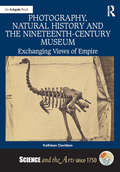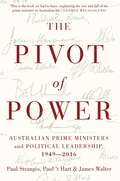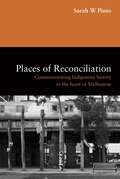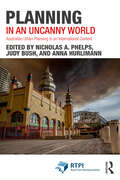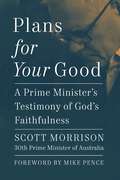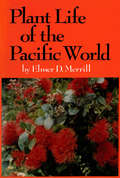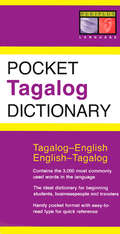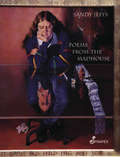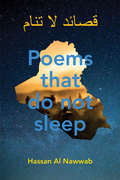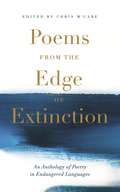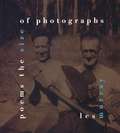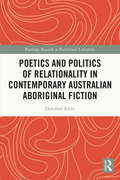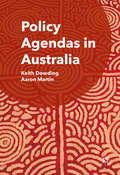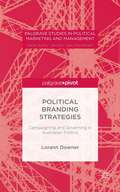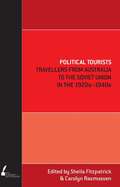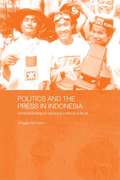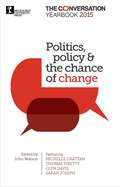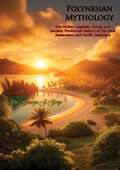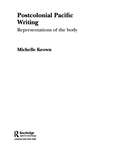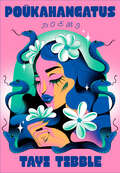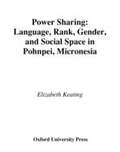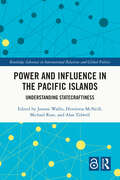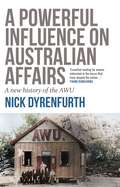- Table View
- List View
Photography, Natural History and the Nineteenth-Century Museum: Exchanging Views of Empire (Science and the Arts since 1750)
by Kathleen DavidsonThe Victorian era heralded an age of transformation in which momentous changes in the field of natural history coincided with the rise of new visual technologies. Concurrently, different parts of the British Empire began to more actively claim their right to being acknowledged as indispensable contributors to knowledge and the progress of empire. This book addresses the complex relationship between natural history and photography from the 1850s to the 1880s in Britain and its colonies: Australia, New Zealand and, to a lesser extent, India. Coinciding with the rise of the modern museum, photography’s arrival was timely, and it rapidly became an essential technology for recording and publicising rare objects and valuable collections. Also during this period, the medium assumed a more significant role in the professional practices and reputations of naturalists than has been previously recognized, and it figured increasingly within the expanding specialized networks that were central to the production and dissemination of new knowledge. In an interrogation that ranges from the first forays into museum photography and early attempts to document collecting expeditions to the importance of traditional and photographic portraiture for the recognition of scientific discoveries, this book not only recasts the parameters of what we actually identify as natural history photography in the Victorian era but also how we understand the very structure of empire in relation to this genre at that time.
Pivot of Power: Australian Prime Ministers and Political Leadership, 1949-2016
by Paul 't Hart James Walter Paul StrangioThe prime ministership remains the main prize in Australian politics, but it is a precarious one. Leadership turnover in recent years has seen more prime ministers rise and fall than at any time since the decade after federation. What explains this volatility? The Pivot of Power is the second volume in a unique blend of collective biography and institutional history that shows the skills, limitations and passions of incumbents are only part of the story. The ways in which prime ministers thrive and fail are influenced by the resources at their command, the evolving nature of the parties they lead, the daunting public expectations they face under a relentless media gaze, and the challenges that history throws at them. Recent changes in these areas have had a destabilising effect and made the role of prime minister more onerous than ever. After decades of strong national leadership, the office has rarely seemed quite so confounding as it does for its contemporary holders. The Pivot of Power explains how this has come about. And its rich account of prime-ministerial fortune since the mid-twentieth century yields historical lessons for overcoming the current malaise.
Places of Reconciliation: Commemorating Indigenous History in the Heart of Melbourne
by Sarah W PintoCentral Melbourne is filled with markers of the city's pasts. At its heart are the stories of exploration and settlement, of the so-called first to arrive, and of the building of a colony and nation. But when it comes to its Indigenous pasts, the centre of Melbourne has long been a place of silence. Over the last two decades, Indigenous histories and peoples have been brought into central Melbourne's commemorative landscapes. Memorials, commemorative markers, namings and public artworks have all been used to remember the city's Indigenous pasts. Places of Reconciliation shows how they came to be part of the city, and the ways in which they have challenged the erasures of its Indigenous histories. Sarah Pinto considers the kind of places that have been made and unmade by these commemorations, and concludes that the twenty-first century settler city does not give up its commemorative landscapes easily.
Planning in an Uncanny World: Australian Urban Planning in an International Context (RTPI Library Series)
by Nicholas A. Phelps Judy Bush Anna HurlimannThis book places Australian conditions and urban planning centrally within comparative analysis of planning systems and cultures around the world to address issues including urban governance, climate change, transportation planning, regional development and migration planning. Australian urban conditions and their associated planning responses can and often have been seen as unique or exceptional. They are seldom discussed in the same breath as conditions and associated planning systems internationally. Yet, as well as being somewhat different from those elsewhere in the world, Australian urban conditions and planning responses are also somewhat similar. They are uncanny – strangely familiar yet unfamiliar. In this book, Australian urban conditions, and their planning policies and practices are informally compared and contrasted with those existing internationally. If Australian urban planning policy and practice have had limited influence internationally, the partial familiarity of challenges posed by its urban conditions ensure that Australia is a more important global reference point for scholarship and practice than commonly is appreciated. In this book the authors assert the potential and actual originality of urban planning scholarship arising from the Australian context. It will be useful for students and faculty, planners working in Australia, as well as anyone interested in international planning debates.
Plans For Your Good: A Prime Minister's Testimony of God's Faithfulness
by Scott MorrisonScott Morrison, Australia's 30th Prime Minister (2018-2022), offers a unique insider's account of a Christian who was open about his faith and operated at the top level of politics for more than a decade. During one of the toughest periods since the second world war, covering drought, wildfires, a global pandemic and recession, he chronicles God's faithfulness throughout, win or lose, public criticism or public success.Less political memoir and more pastoral encouragement, Morrison is passionate about encouraging others to discover how they can access and see the many blessings of God in their own lives, no matter their circumstances, drawing on Jeremiah 29:11, that God's plans are for our good and not our harm, to give us a future and a hope. In each section Morrison asks the questions all of us are looking to find answers to:Who am I? Discovering your purpose.How should I live? Finding your pathway.What should I hope for? Embracing your future. Full of fascinating insights into the handling of some of the most significant global events and issues of our time Morrison's honest, vulnerable and reflective answers offers a unique lens to better understand your relationship with God and the blessing that can flow from such a relationship.Alongside an account of high-level politics in a new media age where cancel culture, identity politics and deep secularization is taking hold across so many western societies, creating a truly post Christian west, Morrison testifies to the faithful love and blessings of God.
Plant Life of the Pacific World
by Elmer D. MerrillThis Asian ecology book offers an overview of the plant life of the vast Pacific region.Among the topics covered are the tropical forest and jungles, the grasslands, the primary and secondary forest, and the plants of the seashores. <P><P>Weeds and cultivated plants are also discussed with overviews of plant distribution and notes on specific islands and island groups.Plant Life of the Pacific World will fill a great need as an important reference source not only for the ethnobotanist but for the professional botanist and the student interested in the flora of the Pacific basin. The information it contains-adequately detailed and clearly presented-should also open the eyes of both visitors and inhabitants to the natural riches of the Pacific region.
Pocket Tagalog Dictionary
by Renato PerdonThis is a pocket sized Tagalog (Filipino) DictionaryIntended for use by tourists, students, and business people traveling to The Philippines Pocket Tagalog Dictionary is an essential tool for communicating in Tagalog. It features all the essential Tagalog vocabulary appropriate for beginning to intermediate students. It's handy pocket format and easy-to read type will make any future trip to The Philippines much easier. In addition to being an excellent English to Tagalog dictionary and Tagalog to English dictionary Pocket Tagalog Dictionary contains important notes on the Tagalog language, Tagalog grammar and Tagalog pronunciation. All Filipino words are written in English and Tagalog so that in the case of difficulties the book can simply be shown to the person the user is trying to communicate with.This dictionary contains:The 3,000 most commonly used words in the Tagalog languageAn introduction to and history of the Tagalog languageInformation on Tagalog grammarA guide to pronouncing Tagalog correctlyOther books from this bestselling series you might enjoy are: Pocket Vietnamese Dictionary, Pocket Cambodian Dictionary, Pocket Thai Dictionary, Pocket Indonesian Dictionary, and Pocket Malay Dictionary.
Pocket Tagalog Dictionary
by Renato PerdonThis is a pocket sized Tagalog (Filipino) DictionaryIntended for use by tourists, students, and business people traveling to The Philippines Pocket Tagalog Dictionary is an essential tool for communicating in Tagalog. It features all the essential Tagalog vocabulary appropriate for beginning to intermediate students. It's handy pocket format and easy-to read type will make any future trip to The Philippines much easier. In addition to being an excellent English to Tagalog dictionary and Tagalog to English dictionary Pocket Tagalog Dictionary contains important notes on the Tagalog language, Tagalog grammar and Tagalog pronunciation. All Filipino words are written in English and Tagalog so that in the case of difficulties the book can simply be shown to the person the user is trying to communicate with.This dictionary contains:The 3,000 most commonly used words in the Tagalog languageAn introduction to and history of the Tagalog languageInformation on Tagalog grammarA guide to pronouncing Tagalog correctlyOther books from this bestselling series you might enjoy are: Pocket Vietnamese Dictionary, Pocket Cambodian Dictionary, Pocket Thai Dictionary, Pocket Indonesian Dictionary, and Pocket Malay Dictionary.
Poems From the Madhouse
by Sandy JeffsA powerful collection of poetry about schizophrenia, with an introduction for young people, discussing the causes/effects .
Poems That Do Not Sleep
by Hassan Al NawwabHassan Al Nawwab is a former Iraqi soldier who came to Australia after the war with his family 20 years ago. With devastating simplicity, these imagistic poems speak of war and terror, of homesickness in exile, the blessings of peace and the pain of belonging. The collection is in two parts, ‘Tree Flying' and ‘Diaspora', and each poem is presented with its counterpart in Arabic on the opposite page, as translated from English by the poet himself.
Poems from the Edge of Extinction: The Beautiful New Treasury of Poetry in Endangered Languages, in Association with the National Poetry Library
by Chris McCabeOne language is falling silent every two weeks. Half of the 7,000 languages spoken in the world today will be lost by the end of this century. With the loss of these languages, we also lose the unique poetic traditions of their speakers and writers.Poems from the Edge of Extinction gathers together 50 poems in languages from around the world that have been identified as endangered; it is a celebration of our linguistic diversity and a reminder of our commonalities and the fundamental role verbal art plays in human life around the world. With poems by influential, award-winning poets such as US poet laureate Joy Harjo, Hawad, Valzhyna Mort, and Jackie Kay, this anthology offers a unique insight into both languages and poetry, taking the reader on an emotional, life-affirming journey into the culture of these beautiful languages.Each poem appears in its original form, alongside an English translation, and is accompanied by a commentary about the language, the poet and the poem - in a vibrant celebration of life, diversity, language, and the enduring power of poetry.This timely collection is passionately edited by widely published poet and UK National Poetry Librarian, Chris McCabe, who is also the founder of the Endangered Poetry Project, a major project launched by London's Southbank Centre to collect poetry in the world's disappearing languages, and introduced by Dr Mandana Seyfeddinipur, Director of the Endangered Languages Documentation Programme and the Endangered Languages Archive at SOAS University of London, and Dr Martin Orwin, Senior Lecturer in Somali and Amharic, SOAS University of London.Languages included in the book: Assyrian; Belarusian; Chimiini; Irish Gaelic; Maori; Navajo; Patua; Rotuman; Saami; Scottish Gaelic; Welsh; Yiddish; Zoque.Poets included in the book: Joy Harjo; Hawad; Jackie Kay; Aurélia Lassaque; Nineb Lamassu; Gearóid Mac Lochlainn; Valzhyna Mort; Laura Tohe; Taniel Varoujan; Avrom Sutzkever.
Poems the Size of Photographs
by Les MurrayBrief, that place in the yearwhen a blossoming pear treewith its sweet laundered scentreinhabits wooden roadsthat arch and diverge upinto electronic snow city. --"Brief, That Place in the Year"In Poems The Size of Photographs, Les Murray deftly maneuvers through familiar themes--the local terrain of the Australian people, politics, and landscape, as well as the terrain that is harder to render tangible: history, myth, and symbol. As if trying to find the fissure through which to crack open his subject matter, Murray has sharpened his form to an ideogrammatic brevity. Each snapshot-like poem in this volume develops before the reader's very eyes, as the initially observed object or moment in time changes meaning and grows in complexity and resonance line by line.
Poetics and Politics of Relationality in Contemporary Australian Aboriginal Fiction (Routledge Research in Postcolonial Literatures)
by Dorothee KleinPoetics and Politics of Relationality in Contemporary Australian Aboriginal Fiction is the first sustained study of the formal particularities of works by Bruce Pascoe, Kim Scott, Tara June Winch, and Alexis Wright. Drawing on a rich theoretical framework that includes approaches to relationality by Aboriginal thinkers, Edouard Glissant, and Jean-Luc Nancy, and recent work in New Formalism and narrative theory, it illustrates how they use a broad range of narrative techniques to mediate, negotiate, and temporarily create networks of relations that interlink all elements of the universe. Through this focus on relationality, Aboriginal writing gains both local and global significance. Locally, these narratives assert Indigenous sovereignty by staging an unbroken interrelatedness of people and their Land. Globally, they intervene into current discourses about humanity’s relationship with the natural environment, urging readers to acknowledge our interrelatedness with and dependence on the land that sustains us.
Policy Agendas in Australia
by Keith Dowding Aaron MartinThis book contributes to and expands on the major international Comparative Policy Agendas Project. It sets the project in context, and provides a comprehensive assessment of the changing policy agenda in Australia over a forty-year period, using a unique systematic dataset of governor-general speeches, legislation and parliamentary questions, and then mapping these on to media coverage and what the public believes (according to poll evidence) government should be concentrating upon. The book answers some important questions in political science: what are the most important legislative priorities for government over time? Does the government follow talk with action? Does government attend to the issues the public identifies as most important? And how does media attention follow the policy agenda? The authors deploy their unique dataset to provide a new and exciting perspective on the nature of Australian public policy and the Comparative Policy Agendas Project more broadly.
Political Branding Strategies: Campaigning and Governing in Australian Politics (Palgrave Studies In Political Marketing And Management)
by Lorann DownerPolitical Branding Strategies.
Political Tourists
by Sheila Fitzpatrick Carolyn RasmussenFor Socialists and many liberals, the Soviet Union of the 1920s-1940s was the site of the great Socialist Experiment. Most Australians who travelled there wrote about their extraordinary experiences, and the recent opening of the Soviet archives gave access to the Soviets' reactions to their visitors. Collecting the research of leading historians and writers, Political Tourists explores Soviet tourism through figures such as Eric Ashby, RM Crawford, Reg Ellery, Neill Greenwood, Esmonde Higgins, Katharine Susannah Prichard, Betty Roland and Jessie Street. Drawing on both Australian and Soviet archives, this is a unique insight into the Soviet experience in the 1920s-1940s.
Politics and the Press in Indonesia: Understanding an Evolving Political Culture
by Angela RomanoThis book explores the evolving political culture in Indonesia, by discussing the country's dominant political philosophies, then showing how those philosophies affect the working lives of ordinary Indonesian citizens. It focuses in particular on the working lives of news journalists, a group that occupies a strategic social and political position.
Politics, policy & the chance of change: The Conversation Yearbook 2015
by John WatsonContinued political and economic turbulence, pervasive threats of terrorism and climate change: 2015 was a testing year. Even Australia's charmed run as 'the lucky country' threatened to come to an end. The pressures of government resulted in Malcolm Turnbull ousting Tony Abbott to become the country's fifth prime minister in five years. Will this prove to be a case of history repeating itself, or a turning point? This collection of articles from The Conversation traverses the year's highs and lows, the issues and possible solutions from experts in education, environment and energy, business and health, the arts and society. Some commentators or writers capture events as they happened, others take a longer view, but all bring academic expertise to bear on the issues of the day and the challenges of tomorrow.
Polynesian Mythology: The Myths, Legends, Songs and Ancient Traditional History of the New Zealanders and Pacific Islanders
by Sir George J Grey“Sir George Grey was among the first chroniclers to explore Hawaii and the South Sea Isles with an aim of writing down the local legends and myths - this collection contains the amazing results of his journey.It was not the author's original plan to record the myths and legends of the Polynesian people - a government posting in New Zealand, and his subsequent encounters with natives and their chieftains, spurred an interest in the region's rich storytelling history. Many chieftains would quote different proverbs and narratives in common, summarizing the deeds of heroes such as Maui and Tawhaki. Many of the myths and legends reflected the Polynesian society's maritime nature - prowess upon the seas, be it in intrepid sailing or hunting great beasts of the deep, is a recurring theme.The peoples of Polynesia were spread over thousands of miles of island chains in the Pacific Ocean, and were mindful of the great distances their boats had covered. The discovery of New Zealand itself was subject to a legendary story; it being an island far greater in size than any discovered before. Tales of rituals and magic connected with nature leads Sir Grey to speculate about some arcane link between Polynesia and ancient Mexico - at the time, the supernatural qualities found in this lore were considered barbarous, and ignoble in the face of the Christianity of Western explorers.”-Print ed.
Postcolonial Pacific Writing: Representations of the Body (Routledge Research in Postcolonial Literatures #Vol. 9)
by Michelle KeownThis major new interdisciplinary study focuses on the representation of the body in the work of eight of Polynesia's most significant contemporary writers. Drawing on anthropology, psychoanalysis, philosophy, history and medicine, Postcolonial Pacific Writing develops an innovative postcolonial framework specific to the literatures and cultures of this region.
Poukahangatus: Poems
by Tayi TibbleThe American debut of an acclaimed young poet as she explores her identity as a twenty-first-century Indigenous woman. Poem by poem, Tibble carves out a bold new way of engaging history, of straddling modernity and ancestry, desire and exploitation.Intimate, moving, virtuosic, and hilarious, Tayi Tibble is one of the most exciting new voices in poetry today. In Poūkahangatus (pronounced &“Pocahontas&”), her debut volume, Tibble challenges a dazzling array of mythologies—Greek, Māori, feminist, kiwi—peeling them apart, respinning them in modern terms. Her poems move from rhythmic discussions of the Kardashians, sugar daddies, and Twilight to exquisite renderings of the natural world and precise emotions (&“The lump in her throat swelled like a sea that threatened to take him from her, and she had to swallow hard&”). Tibble is also a master narrator of teenage womanhood, its exhilarating highs and devastating lows; her high-camp aesthetics correlate to the overflowing beauty, irony, and ruination of her surroundings. These are warm, provocative, and profoundly original poems, written by a woman for whom diving into the wreck means taking on new assumptions—namely, that it is not radical to write from a world in which the effects of colonization, land, work, and gender are obviously connected. Along the way, Tibble scrutinizes perception and how she as a Māori woman fits into trends, stereotypes, and popular culture. With language that is at once colorful, passionate, and laugh-out-loud funny, Poūkahangatus is the work of one of our most daring new poets.
Power Crisis
by Rodney CavalierWritten by former minister and Labor historian Rodney Cavalier, Power Crisis is an explosive account of the self-destruction of the New South Wales Labor government, which has seen a turnover of four premiers in five years, and is heading for rejection and even humiliation by voters at the next state election. While the catalyst was the thwarted attempt to privatise electricity, Cavalier reveals that the real issue is the takeover of Labor by a professional political class without connection to the broader community or the party's traditions. Featuring interviews with ex-premiers Iemma and Rees, Power Crisis contrasts the current turmoil and self-indulgence with the stability within New South Wales Labor over generations before, and asks, 'What went wrong?'
Power Sharing: Language, Rank, Gender and Social Space in Pohnpei, Micronesia
by Elizabeth KeatingLinguistic anthropologist Elizabeth Keating went to the island of Pohnpei, in Micronesia, and studied how people use language and other semiotic codes to reproduce and manipulate status differences.
Power and Influence in the Pacific Islands: Understanding Statecraftiness (Routledge Advances in International Relations and Global Politics)
by Michael Rose Joanne Wallis Henrietta McNeill Alan TidwellThis book outlines an analytical framework to understand power, influence, and statecraft in the Pacific Islands region. With contributions by scholars from the United States, Australia, China, New Zealand, and across the Pacific Islands region, it provides ‘both sides of the story’ of statecraft and explores how power and influence are being exercised in the Pacific Islands. Amid escalating strategic competition, the United States, China, Australia, and a range of other partners are trying to exercise power and influence in their Pacific Islands region through their statecraft. But which partners are doing what, where are they doing it, and how are Pacific Island countries and people responding? Through case studies of key examples – such as economic assistance, defence diplomacy, scholarships, and strategic narratives – this book analyses how tools of statecraft are being deployed by a range of key partners and Pacific Island states, and how they are being received by Pacific Island countries and people.A vital resource for scholars and practitioners in International Relations and diplomacy as well as those seeking to understand how statecraft, power, and influence are being exercised in the Pacific Islands region.The Open Access version of this book, available at http://www.taylorfrancis.com, has been made available under a Creative Commons [Attribution-Non Commercial-No Derivatives (CC-BY-NC-ND)] 4.0 license.
Powerful Influence on Australian Affairs: A New History of the AWU
by Nick DyrenfurthIn this new history of the Australian Workers' Union, prominent author Nick Dyrenfurth traces the fortunes of the nation's oldest continuously operating trade union from its origins in the shearing sheds of the late nineteenth century through to it present-day representation of modern Australia's diverse workforce. The 131-year-old AWU's coverage of rural and regional industries, impact on Australia's national identity, and sway over the ALP have made the union a unique organisation internationally. A Powerful Influence on Australian Affairs tells the story of the AWU's numerous triumphs and crises, colourful characters and famed leaders, political influence, and the changing working lives and aspirations of its rank-and-file membership.
